Karolina Hird, Christina Harward, Kateryna Stepanenko, Angelica Evans, and Frederick W. Kagan
Russian officials announced that Russian law enforcement suppressed the antisemitic riots in Makhachkala, Republic of Dagestan on October 30. The Russian Ministry of Internal Affairs (MVD) stated that employees of the MVD and other law enforcement agencies suppressed mass riots in Makhachkala and restored order at the local airport after identifying over 150 participants and detaining 60 rioters.[1] The MVD also claimed that rioters injured at least nine police officers and that searches for other rioters are ongoing. Dagestan Head Sergey Melikov claimed that he personally inspected the Makhachkala airport, which sustained minor damage, and claimed that the MVD and Rosgvardia used physical force as a last resort in hopes of calming the mob with reason.[2] Russian sources claimed that rioters threw stones at law enforcement and that officers responded by firing guns into the air.[3] Melikov stated that unspecified foreign actors, including pro-Ukrainian Telegram channels, are attempting to destabilize the region and claimed that the Telegram channel that published the rumors of the arrival of “Israeli refugees” in Dagestan was managed from Ukrainian territory.[4]
Russian President Vladimir Putin responded to the October 29 antisemitic demonstrations in Dagestan by accusing Ukraine of trying to “instigate pogroms in Russia” under Western guidance.[5] Putin claimed during a meeting with members of the Russian Security Council on October 30 that demonstrations in Makhachkala “were inspired, among other things, through social networks, from Ukraine’s territory by Western intelligence services.” Putin added that the West is trying to use regional conflicts to break Russia from within, and tasked regional authorities with undertaking “firm, timely and clear actions to protect the constitutional system of Russia, the rights and freedoms of [Russian] citizens, interethnic and interreligious harmony.” Putin did not specify which measures Russia will undertake to resolve interreligious conflicts and antisemitism in Russia, however. Kremlin Spokesperson Dmitry Peskov did not comment on the measures that could be taken against the demonstrators.[6] Kremlin officials largely reiterated similar statements prior to Putin’s speech and refrained from directly condemning the rioters, and the Kremlin’s narrative about foreign involvement in the riots is likely an attempt to deflect from the international criticism of antisemitism and growing animosity towards ethnic and religious minorities in Russia.[7]
A minority of Russian officials directly condemned rioters and regional authorities for ignoring antisemitic attitudes in Dagestan. Melikov stated that rioters betrayed Russian servicemen fighting in Ukraine by “playing for the enemy” and noted that he was ashamed about the riots.[8] Russian State Duma Deputy Vasiliy Vlasov criticized Dagestani authorities for ignoring antisemitic attitudes and unrest that lasted for three days.[9] Vlasov added that unnamed regional officials should be dismissed from their positions for failing to preempt the riots in time.
The October 29 riots in Dagestan highlight the growing radicalization and factionalism of Russian society resulting from the hyper-nationalist ideologies that the war in Ukraine has empowered. Director of the NATO Strategic Communications Centre of Excellence Janis Sarts stated that events in Makhachkala represent some of the manifestations of the radicalization of the Russian society resulting from the war in Ukraine and the surrounding media environment.[10] Sarts stated that Russian media has been inciting hatred against Ukrainians, the West, and Israel and observed that many deceased Russian servicemen who had fought in Russia’s full-scale invasion of Ukraine hailed from Dagestan. A Russian milblogger similarly implied that the Kremlin’s efforts to blame the riots on foreign psychological and information operations allow Russian officials to avoid responsibility for enabling the strengthening of radical sentiments among Russian Muslim populations.[11] ISW has previously assessed that the hyper-nationalist ideologies espoused by the Kremlin as the justifications for the war are having domestic ramifications for Russia, particularly in ethnic minority communities.[12]
Unidentified Russian soldiers reportedly murdered a Ukrainian family in occupied Volnovakha, Donetsk Oblast, further highlighting a threatening environment of violence that is pervasive throughout the occupied areas of Ukraine. Ukrainian Human Rights Ombudsman Dmytro Lubinets stated on October 29 that Russian troops killed nine civilians, including two young children, in their home in Volnovakha overnight and suggested that Chechen units may have committed the murders because the family refused to shelter Chechen forces in their house.[13] Several Ukrainian sources and a prominent Russian insider source reported that forensic evidence indicates that well-prepared and well-equipped military personnel likely perpetrated the attack.[14] Attacks on civilians hors de combat (in rear areas far removed from active combat zones) by representatives of an occupying power constitute a clear violation of multiple international legal norms and very likely rise to the level of a war crime or crime against humanity.[15]
Several Russian commentators exploited the circumstances of the tragedy in Volnovakha to accuse Ukraine of trying to stoke interethnic tensions within the Russian information space. One Russian milblogger claimed that Ukrainian sources first reported that “Kadyrov’s men” (in reference to Chechen troops) committed the murders and linked the issue to the October 29 riots in Dagestan.[16] Another Russian milblogger claimed that Chechen forces are not deployed anywhere near Volnovakha and accused the Ukrainian information space of trying to use Chechens as a “trigger” to further destabilize Russia.[17] The fixation on the Ukrainian accusation rather than on the atrocity itself, the need to hold the perpetrators accountable, or the unprofessionalism and indiscipline of soldiers committing such crimes suggests that these Russian commentators are very concerned about inter-ethnic tensions in Russia and the Russian armed forces.
Ukrainian forces made confirmed advances near Bakhmut and in western Zaporizhia Oblast on October 30. Geolocated footage posted on October 30 shows that Ukrainian forces have advanced northeast of Kurdyumivka (10km southwest of Bakhmut).[18] Additional geolocated footage from October 29 indicates that Ukrainian forces have marginally advanced west of Robotyne in western Zaporizhia Oblast.[19] The Ukrainian General Staff reiterated that Ukrainian forces are continuing offensive actions near Bakhmut and offensive operations in the Melitopol (western Zaporizhia Oblast) direction.[20]
Russian forces continue to use “Storm-Z” assault units predominantly made up of prisoner recruits in highly attritional infantry-led frontal assaults. Ukrainian Tavriisk Group of Forces Spokesperson Colonel Oleksandr Shtupun stated on October 30 that Russian forces are preparing to conduct “meat assaults” (colloquial jargon for infantry-led frontal assaults) near Avdiivka and are training “Storm-Z” assault units for future assaults without equipment.[21] A Russian milblogger reportedly serving in the Avdiivka direction claimed that “meat assaults” are when Russian infantry forces attack without artillery support to suppress Ukrainian firing positions.[22] The milblogger claimed that when two Russian regiments conduct ”meat assaults” side by side, the seam between the areas of responsibility of both regiments remains unsecured and vulnerable to Ukrainian counterattacks. Another Russian milblogger claimed that “Storm-Z” assault detachments in the Avdiivka direction and on Bakhmut’s southern flank are often destroyed after a few days of active operations and on average lose between 40-70 percent of their personnel.[23] The milblogger criticized the Russian military’s poor training of “Storm-Z” units and the unwillingness of superior officers to consider the proposals of “Storm-Z” commanders when assigning them combat missions. The milblogger stated that “Storm-Z” units are often introduced into battle before conducting reconnaissance or establishing connections with neighboring units and typically struggle to evacuate their wounded without artillery cover, leading to higher losses. Both milbloggers noted the lack of proper artillery support for Russian attacks and counterattacks.[24] One milblogger stated that these factors contribute to “Storm-Z” units being turned into “trash” before achieving any significant results.[25] ISW has frequently reported on the ineffectiveness of “Storm-Z” units.[26]
Russian Defense Minister Sergei Shoigu highlighted the allegedly cooperative nature of the Russian-Chinese relationship at the 10th Beijing Xiangshan Forum on October 30. Shoigu labeled the Russian-Chinese relationship as a “comprehensive partnership and strategic interaction” and stated that Russia and China consider each other “priority partners.”[27] Shoigu claimed that the confidential contacts between Russian President Vladimir Putin and Chinese President Xi Jinping play a “special role” in maintaining the “traditionally friendly relations” between the two states.[28] Shoigu highlighted Russia’s cooperation with the Association of Southeast Asian Nations (ASEAN) and the Shanghai Cooperation Organization (SCO) and noted Russia’s desire to increase military and military-technical cooperation with states in the Asian-Pacific region.[29] Despite Shoigu’s characterizations of the Russian-Chinese partnership, the majority of his speech focused not on Russia’s relationship with China, but rather on the alleged threats of the West, NATO, and the war in Ukraine, likely in an attempt to paint a picture of a world hostile to Moscow and Beijing.[30] ISW continues to assess that China has reservations concerning the Kremlin’s desired ”no limits partnership” between the two states.[31]
Russian forces conducted a series of missile and drone strikes against Ukraine on the night of October 29 to 30. The Ukrainian General Staff reported on October 30 that Russian forces launched 12 Shahed 131/136 drones, two Kh-59 missiles, and four Iskander missiles against Ukraine and that Ukrainian air defenses downed all the Shahed drones and the Kh-59s.[32] The Ukrainian Southern Operational Command stated that Russian Iskander missiles struck port infrastructure in Odesa Oblast.[33] A Russian milblogger claimed that Russian forces are beginning to use several new “smart” glide bombs – the FAB-250, FAB-500, and FAB-1500.[34] The milblogger claimed that the new glide bombs have laser and satellite guidance, making the accuracy of their impact radius as small as 5 meters, compared to conventional air bombs with an accurate impact radius of 50 meters. The bombs reportedly have a strike range of 200 kilometers. The milblogger claimed that Russian FAB-250 bombs weigh 250 kilograms, hold an explosive weight of 99 kilograms, have a damage radius of 120 meters, and can destroy manpower, equipment, and light fortifications. Russian FAB-500 bombs reportedly weigh 500 kilograms, hold an explosive weight of 150 kilograms, have a damage radius of 250 meters, and can destroy headquarters, warehouses, and concrete and reinforced concrete objects. Russian FAB-1500 bombs weigh 1550 kilograms, hold an explosive weight of 675 kilograms, have a damage radius of 500 meters, and can destroy underground bunkers up to 20 meters in depth and penetrate up to 3 meters of reinforced concrete. The milblogger claimed that Russian forces can arm Su-34, Su-30, and Su-35 aircraft with the new glide bombs.
Key Takeaways:
- Russian officials announced that Russian law enforcement suppressed antisemitic riots in Makhachkala, Republic of Dagestan on October 30. Russian President Vladimir Putin responded to the October 29 antisemitic demonstrations in Dagestan by accusing Ukraine of trying to “instigate pogroms in Russia” under Western guidance.
- A minority of Russian officials directly condemned rioters and regional authorities for ignoring antisemitic attitudes in Dagestan.
- The October 29 riots in Dagestan highlight the growing radicalization and factionalism of Russian society resulting from the hyper-nationalist ideologies that the war in Ukraine has empowered.
- Unidentified Russian soldiers reportedly murdered a Ukrainian family in occupied Volnovakha, Donetsk Oblast, further highlighting a threatening environment of violence that is pervasive throughout occupied areas of Ukraine. Several Russian commentators exploited the circumstances of the tragedy in Volnovakha to accuse Ukraine of trying to stoke interethnic tensions within the Russian information space.
- Ukrainian forces made confirmed advances near Bakhmut and in western Zaporizhia Oblast on October 30.
- Russian forces continue to use "Storm-Z" assault units predominantly made up of prisoner recruits in highly attritional infantry-led frontal assaults.
- Russian Defense Minister Sergei Shoigu highlighted the allegedly cooperative nature of the Russian-Chinese relationship at the 10th Beijing Xiangshan Forum on October 30.
- Russian forces conducted offensive operations along the Kupyansk-Svatove-Kreminna line, near Bakhmut, near Avdiivka, west and southwest of Donetsk City, in the western Donetsk-eastern Zaporizhia Oblast border area, and in western Zaporizhia Oblast on October 30 and advanced in some areas.
We do not report in detail on Russian war crimes because these activities are well-covered in Western media and do not directly affect the military operations we are assessing and forecasting. We will continue to evaluate and report on the effects of these criminal activities on the Ukrainian military and the Ukrainian population and specifically on combat in Ukrainian urban areas. We utterly condemn Russian violations of the laws of armed conflict and the Geneva Conventions and crimes against humanity even though we do not describe them in these reports.
- Russian Main Effort – Eastern Ukraine (comprised of two subordinate main efforts)
- Russian Subordinate Main Effort #1 – Capture the remainder of Luhansk Oblast and push westward into eastern Kharkiv Oblast and encircle northern Donetsk Oblast
- Russian Subordinate Main Effort #2 – Capture the entirety of Donetsk Oblast
- Russian Supporting Effort – Southern Axis
- Russian Mobilization and Force Generation Efforts
- Activities in Russian-occupied areas
- Russian Information Operations and Narratives
Russian Main Effort – Eastern Ukraine
Russian Subordinate Main Effort #1 – Luhansk Oblast (Russian objective: Capture the remainder of Luhansk Oblast and push westward into eastern Kharkiv Oblast and northern Donetsk Oblast)
Russian forces continued offensive operations along the Kupyansk-Svatove-Kreminna line on October 30 and made a confirmed advance. Geolocated footage posted on October 30 indicates that Russian troops marginally advanced towards Torske (about 8km southwest of Kreminna).[35] The Ukrainian General Staff reported that Russian forces conducted unsuccessful ground attacks in the Kupyansk direction near Synkivka (7km northeast of Kupyansk) and Ivanivka (20km southwest of Kupyansk) and southeast of Terny (15km northwest of Kreminna).[36] Ukrainian "Steel Cordon" border guard assault brigade spokesperson Ivan Shevstov stated that the most active part of the Kupyansk front is near Synkivka and Ivanivka, and that Russian forces are using groups of between 10 and 30 people in attacks towards Kupyansk.[37] Shevstov noted that Russian forces continue efforts to occupy the left bank of the Oskil River.[38] Russian sources claimed that Russian forces, including airborne (VDV) elements, advanced towards Kupyansk and near Kreminna.[39] Chechen Republic Head Ramzan Kadyrov posted footage purportedly of the "AMURA" group of Chechen "Akhmat" Spetsnaz striking Ukrainian positions in the Serebryanske forest area southwest of Kreminna.[40]
Russian sources claimed that Ukrainian forces conducted counterattacks along the Kupyansk-Svatove-Kreminna area on October 30 and made limited advances. One Russian milblogger claimed that Ukrainian forces counterattacked and regained several positions near Raihorodka (12km west of Svatove).[41] The Russian MoD claimed that Russian forces repelled several Ukrainian attacks in the Kupyansk and Kreminna areas.[42]
Russian Subordinate Main Effort #2 – Donetsk Oblast (Russian objective: Capture the entirety of Donetsk Oblast, the claimed territory of Russia’s proxies in Donbas)
Ukrainian forces reportedly continued offensive operations in the Bakhmut direction on October 30 and made a confirmed advance. Geolocated footage posted on October 30 indicates that Ukrainian forces advanced northeast of Kurdyumivka (10km southwest of Bakhmut).[43] The Ukrainian General Staff stated that Ukrainian forces continue offensive actions south of Bakhmut and are inflicting losses on Russian troops in the area.[44] Several Russian milbloggers claimed that Ukrainian forces unsuccessfully attempted to advance beyond the railway line between Klishchiivka (6km southwest of Bakhmut) and Andriivka (8km southwest of Bakhmut).[45] One milblogger claimed that Ukrainian forces managed to advance beyond the railway line south of Andriivka and consolidate new positions.[46]
Russian forces continued ground attacks near Bakhmut on October 30 but did not make any claimed or confirmed advances. The Ukrainian General Staff reported that Russian troops unsuccessfully attempted to restore lost positions near Andriivka and Klishchiivka.[47] Ukrainian Ground Forces Commander Colonel General Oleksandr Syrskyi stated that Russian forces have "significantly strengthened their group" near Bakhmut and switched from defensive actions to being more "active."[48] ISW cannot independently verify a substantial change in the composition of Russian forces near Bakhmut at this time, however. Russian milbloggers claimed that positional fighting is ongoing northwest of Bakhmut near Berkhivka (on the northwestern outskirts of Bakhmut), Vasyukivka (12km north of Bakhmut), and Orikhovo-Vasylivka (10km northwest of Bakhmut).[49]
Ukrainian forces did not conduct any confirmed or claimed counterattacks near Avdiivka on October 30. Ukrainian military sources noted on October 30 that Ukrainian forces shot down another Russian Su-25 in the Avdiivka direction on October 30, making it the sixth plane shot down in this direction since October 10.[50]
Russian forces continued ground attacks near Avdiivka on October 30 and made a confirmed advance. Geolocated footage posted on October 30 shows a Russian TOS-1A thermobaric artillery system operating in Novoselivka Druha (5km northeast of Avdiivka), confirming that Russian forces occupy the settlement.[51] Russian milbloggers claimed that Russian forces advanced in the "Khimik" micro-district south of Avdiivka, made gains near Berdychi (7km northwest of Bakhmut), and captured a quarry near Sieverne (5km directly west of Avdiivka).[52] Ukrainian military observer Konstantyn Mashovets reported that Russian forces are conducting a "tactical regrouping" in the Avdiivka area that will likely last less than a day before Russian forces resume attacks on the settlement.[53] Mashovets reiterated his assessment that the units involved in this grouping are mainly elements of the 1st Donetsk People's Republic (DNR) Army Corps and the 41st Combined Arms Army (Central Military District).[54] Ukrainian Tavriisk Group of Forces Spokesperson Colonel Oleksandr Shtupun similarly noted that Russian forces are trying to compensate for equipment losses near Avdiivka and preparing to employ heavy infantry-led frontal assaults on Ukrainian positions.[55] The Ukrainian General Staff reported that Ukrainian forces repelled unsuccessful Russian ground attacks near Avdiivka, Novokalynove (10km northwest of Avdiivka), Tonenke (5km west of Avdiivka), Opytne (3km southwest of Avdiivka), and Pervomaiske (10km southwest of Avdiivka).[56]
Ukrainian forces did not conduct any claimed or confirmed ground attacks west or southwest of Donetsk City on October 30.
Russian forces continued ground attacks west and southwest of Donetsk City on October 30 but did not make any confirmed advances. The Ukrainian General Staff reported unsuccessful Russian attacks near Marinka, Novomykhailivka (20km southwest of Donetsk City), and south of Vuhledar (25km southwest of Donetsk City).[57] Russian sources claimed that Russian forces marginally advanced near Novomykhailivka.[58] A Russian milblogger highlighted the activities of the 39th Motorized Rifle Brigade (68th Army Corps, Eastern Military District) in the Novomykhailivka area.[59]
Russian Supporting Effort – Southern Axis (Russian objective: Maintain frontline positions and secure rear areas against Ukrainian strikes)
Ukrainian forces did not conduct any claimed or confirmed attacks in the western Donetsk-eastern Zaporizhia Oblast border area on October 30.
Russian forces conducted offensive operations in the western Donetsk-eastern Zaporizhia Oblast border area on October 30 but did not make any claimed or confirmed gains. The Ukrainian General Staff reported that Russian forces unsuccessfully attacked near Staromayorske (9km south of Velyka Novosilka).[60] Russian sources claimed that Russian forces attacked north of Pryyutne (16km southwest of Velyka Novosilka) and near Novodonetske (12km southeast of Veylka Novosilka) and Novomayorske (18km southeast of Velyka Novosilka) on October 29.[61] A Russian milblogger claimed that fighting continued from October 27-29 for control of the Hrusheva Gully northeast of Pryyutne, following numerous claims from other Russian sources about Russian advances in the area on October 25 and 26.[62]
Ukrainian forces conducted offensive operations in western Zaporizhia Oblast on October 30 and made a confirmed gain. Geolocated footage published on October 29 indicates that Ukrainian forces advanced west of Robotyne (10km south of Orikhiv).[63] Russian sources, including the Russian Ministry of Defense (MoD), claimed on October 29 and 30 that Ukrainian forces unsuccessfully attacked northwest of Verbove (9km east of Robotyne) and near Kopani (7km northwest of Robotyne), Robotyne, and Novoprokopivka (2km south of Robotyne).[64]
Russian forces conducted unsuccessful offensive operations in western Zaporizhia Oblast on October 30. The Ukrainian General Staff reported that Russian forces unsuccessfully attacked near Robotyne.[65]
Ukrainian forces continue to hold positions in the east (left) bank of Kherson Oblast. Russian sources claimed that Ukrainian forces control central Krynky (30km east of Kherson City and 2km from the Dnipro River), and one prominent Russian milblogger claimed that Ukrainian forces marginally expanded their zone of control west of Krynky.[66] Geolocated footage published on October 30 confirms that Russian forces hold positions in forest areas east of Krynky.[67] Multiple Russian sources, including a Wagner Group-affiliated channel, complained about Russian forces’ lack of counterbattery, electronic warfare (EW), and command and control capabilities in the Kherson direction, particularly near Krynky.[68]
Russian forces continued airstrikes against the west (right) bank of Kherson Oblast on October 30. The Ukrainian Southern Operational Command stated that Russian forces used 37 KAB guided bombs to strike the west bank of Kherson Oblast.[69]
Russian sources claimed that Ukrainian forces conducted a mixed series of strikes targeting occupied Crimea on October 29-30. The Russian MoD claimed that Russian air defenses shot down eight Storm Shadow missiles targeting Crimea.[70] A Russian milblogger claimed that Russian air defenses also shot down two Neptune anti-ship missiles and three drones targeting Sevastopol.[71] The milblogger also claimed that Russian air defenses failed to shoot down two Ukrainian ATACMS missiles near Olenivka near Cape Tarkhanhut but that the missiles did not cause any damage.[72] A Russian insider source claimed that the alleged Ukrainian ATACMS strike damaged vehicles and radar systems near Olenivka and killed or wounded more than 20 Russian servicemen.[73] The insider source also claimed that Russian officials did not report on the Ukrainian ATACMS strike but chose to instead issue statements about the downing of Storm Shadow missiles and drones.[74] ISW has not observed either visual confirmation or confirmation from Ukrainian officials of the Ukrainian ATACMS strike, however.
Russian Mobilization and Force Generation Efforts (Russian objective: Expand combat power without conducting general mobilization)
The Ukrainian Resistance Center reported on October 30 that Russian forces are attempting to recruit Ukrainian criminals who were convicted of crimes before 2014 to serve in the Russian military.[75] The Ukrainian Resistance Center stated that the Donetsk and Luhansk occupation administrations have created lists of criminals who were convicted before 2014 and are currently serving sentences in prisons in occupied Donetsk and Luhansk Oblasts and are attempting to coerce these criminals into serving in the Russian military.
Activities in Russian-occupied areas (Russian objective: Consolidate administrative control of annexed areas; forcibly integrate Ukrainian citizens into Russian sociocultural, economic, military, and governance systems)
Occupation authorities continued to forcibly deport Ukrainian civilians to Russia and forcibly militarize them. Luhansk Oblast occupation head Leonid Pasechnik stated on October 30 that occupation authorities have sent 270 residents of occupied Luhansk Oblast, including 169 children, to Sochi, Krasnodar Krai to “improve their health” and “temporarily forget about the war.”[76] Pasechnik stated that occupation authorities sent another group, likely including children, to Sochi on the weekend of October 28-29. The Kherson Oblast occupation administration stated on October 29 that 1,400 students from Kherson Oblast colleges and universities will visit the “sights and places of military glory” in Russia as part of the “More than a Trip” program in the near future.[77]
The Ukrainian Resistance Center reported on October 30 that Russian authorities are attempting to employ demobilized Russian servicemen in occupied Luhansk and Donetsk oblasts.[78] Local occupation administrations are reportedly concerned about crime and other poor behavior committed by demobilized Russian servicemen and are creating a base of local employers willing to hire the veterans.
Russian occupation authorities announced the modernization of vehicle checkpoints along the border between Russia and occupied Ukraine. The Russian Transportation Ministry stated on October 25 that Russian and occupation authorities installed autonomous vehicle detection systems at 10 border checkpoints between Russia and occupied Ukraine.[79] The system collects information about the location and classification of vehicles at checkpoints and transmits the information to the Russian Transportation Ministry’s situation center. The system also collects information on the wait times at the various checkpoints and provides live updates to a website available to the public. The Russian Transportation Ministry advertised the new system to simplify and speed up travel through border checkpoints, although it is also a mechanism for further control over travel between Russia and occupied Ukraine and for collecting personal data on Ukrainian civilians.
Russian Information Operations and Narratives
Russian Defense Minister Sergei Shoigu reiterated boilerplate Kremlin narratives about the Ukrainian counteroffensive, perceived Western aggression towards Russia, and alarmist nuclear rhetoric intended to undermine Western support for Ukraine during a speech at the Beijing Xiangshan Forum on October 30.[80] Shoigu claimed that the Ukrainian counteroffensive has suffered implausible casualties, reporting that the Ukrainian military has lost over 90,000 wounded and killed personnel, almost 600 tanks, and around 1,900 armored vehicles.[81] Shoigu claimed that NATO expansion disregarded Russia’s right to ensure its own security and that the West’s continued escalation with Russia could lead to a direct clash between nuclear powers.[82] Shoigu reiterated that there have been no changes to Russia’s nuclear doctrine and that Russia will only use a nuclear weapon in response to an enemy nuclear strike or against an ”existential threat” to Russia.[83]
Significant activity in Belarus (Russian efforts to increase its military presence in Belarus and further integrate Belarus into Russian-favorable frameworks and Wagner Group activity in Belarus)
Belarusian Defense Minister Lieutenant General Viktor Khrenin met with Iranian Supreme Leader Military Affairs Adviser Major General Yahya Rahim Safavi on the sidelines of the Xiangshan Forum on October 30.[84] The Belarusian Ministry of Defense (MoD) announced that Khrenin and Safavi discussed issues of bilateral military cooperation.
Ukrainian Joint Forces Commander Lieutenant General Serhiy Nayev stated that Belarusian forces only have about 1,800 servicemen operating along the entire Belarusian-Ukrainian international border.[85] Nayev stated that the rest of the Belarusian units are located in the Belarusian rear.
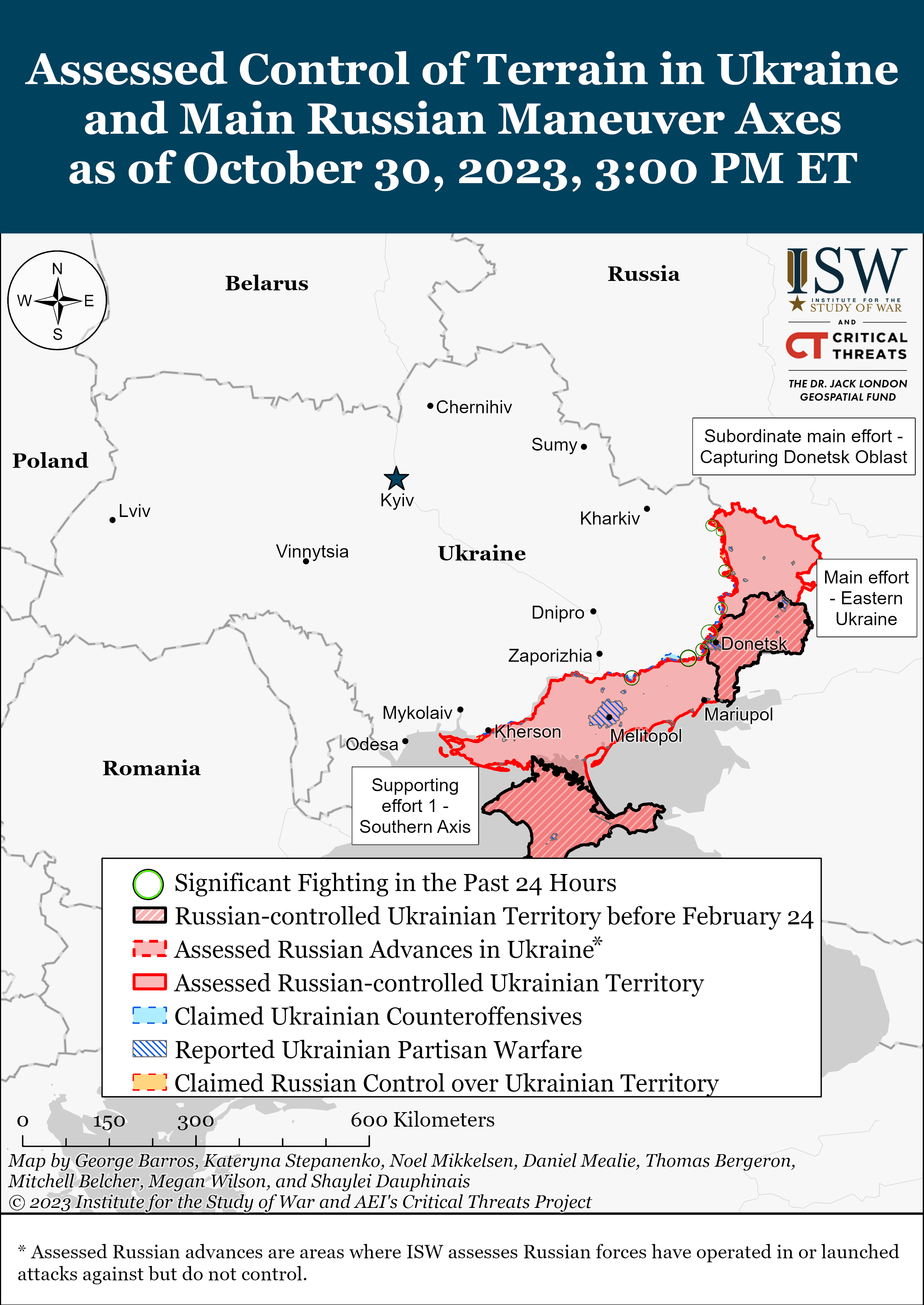
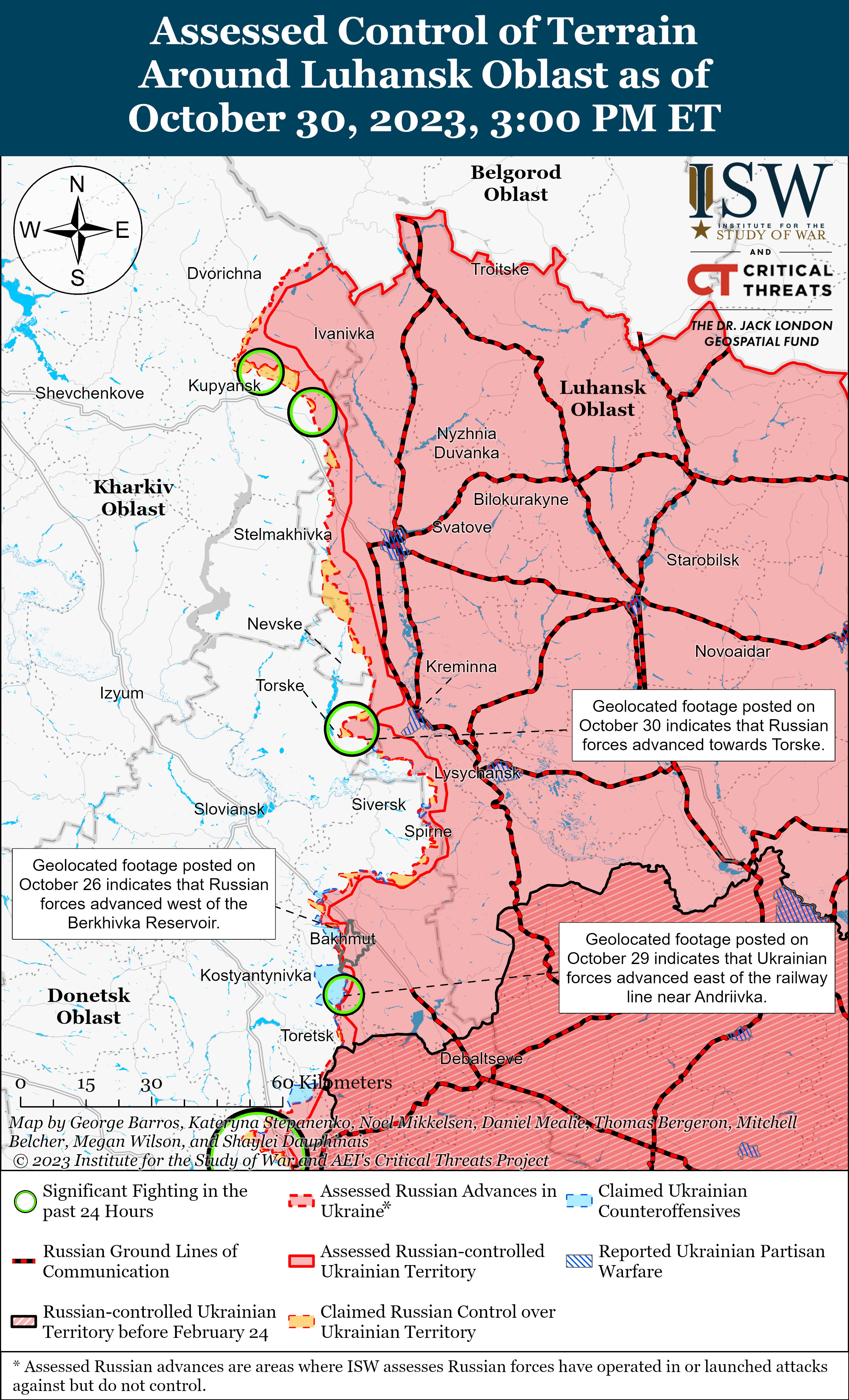
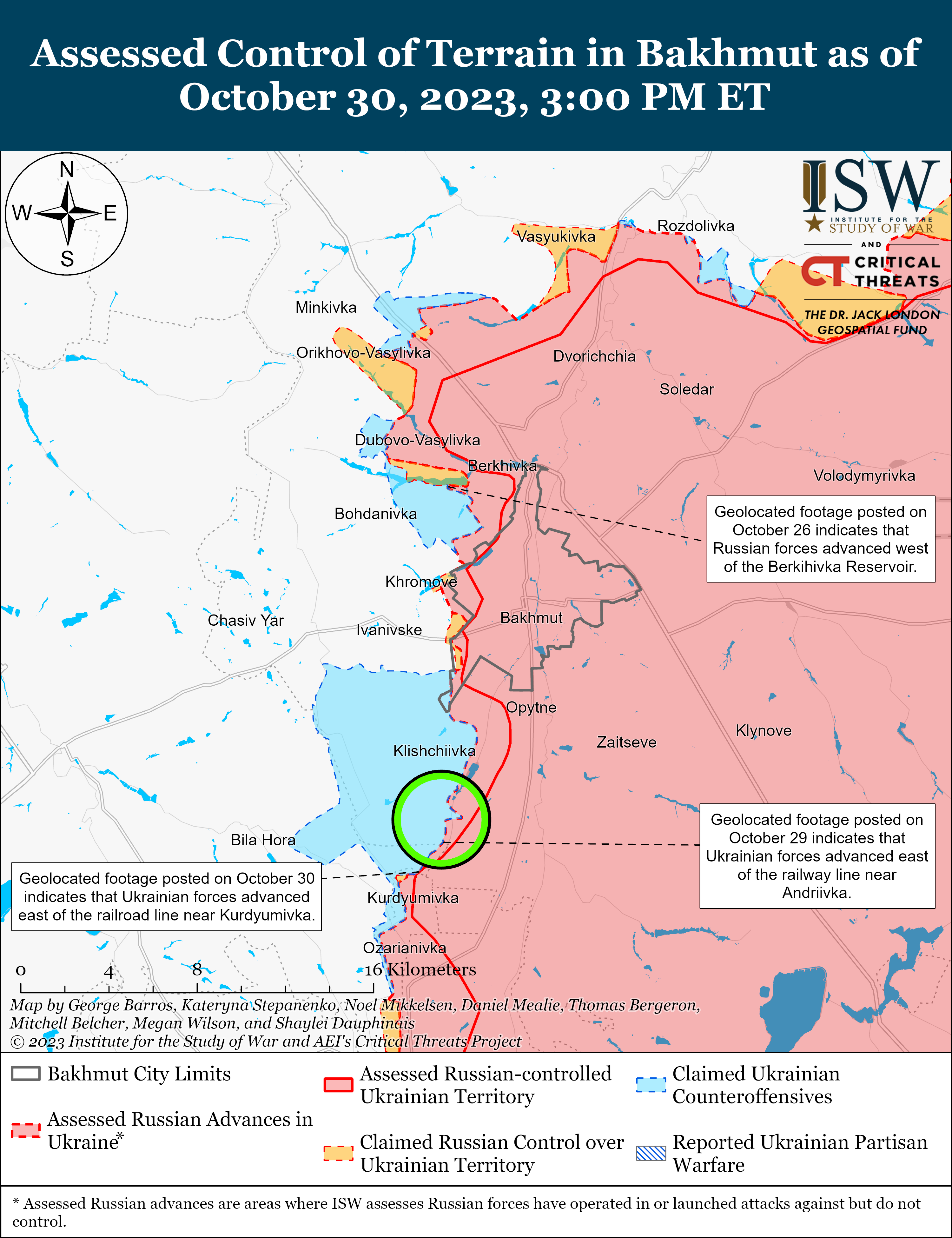
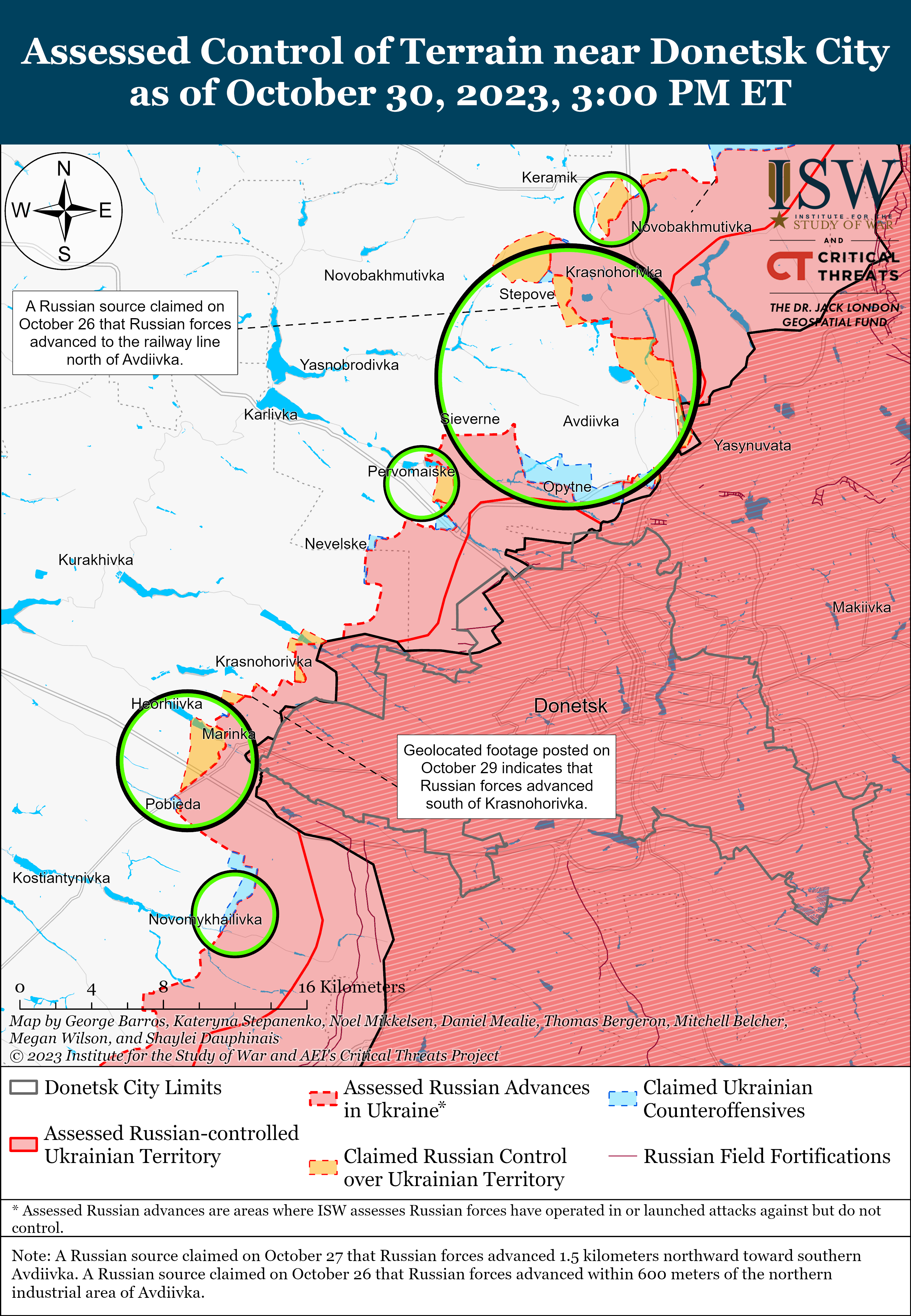
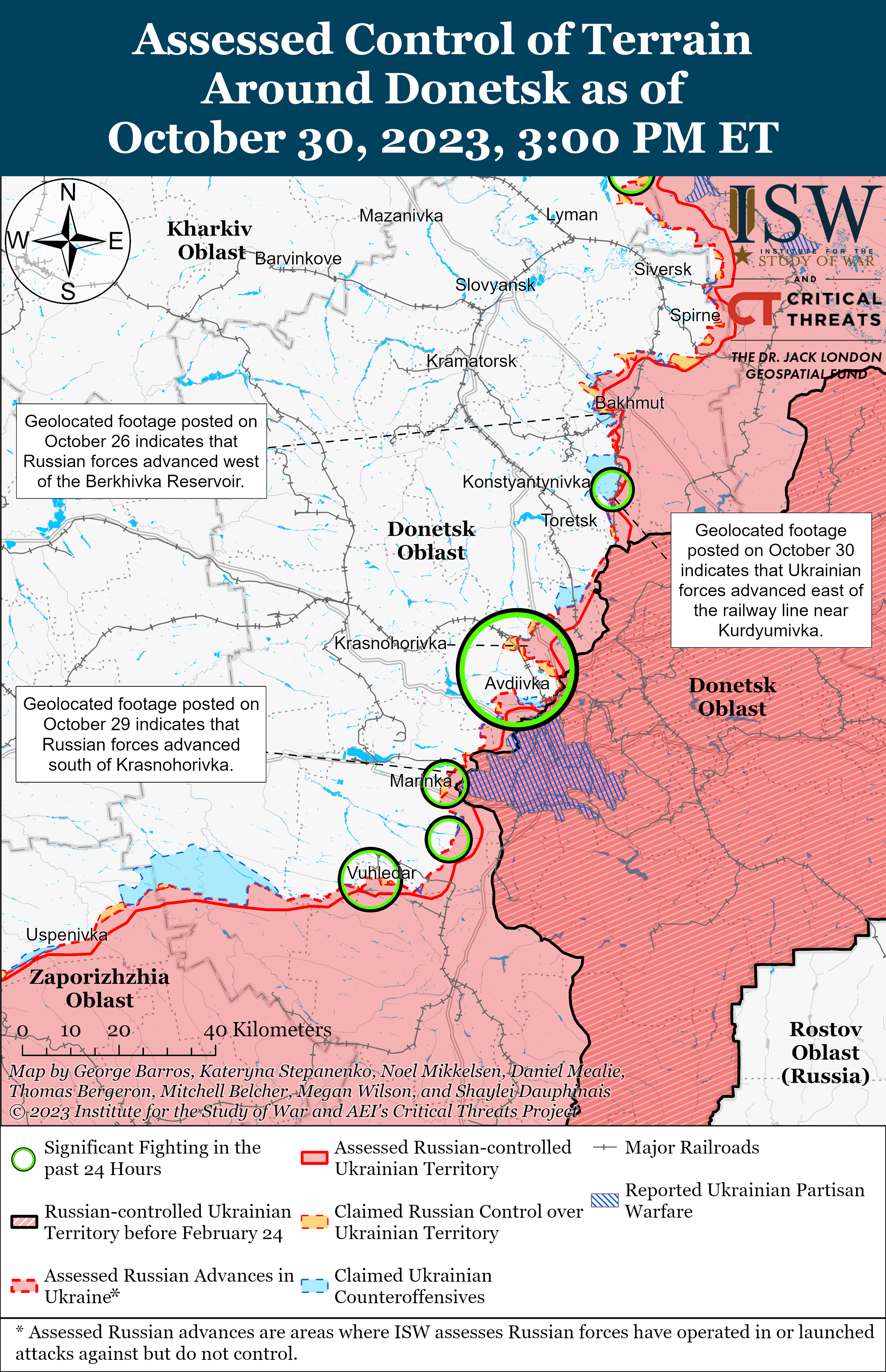
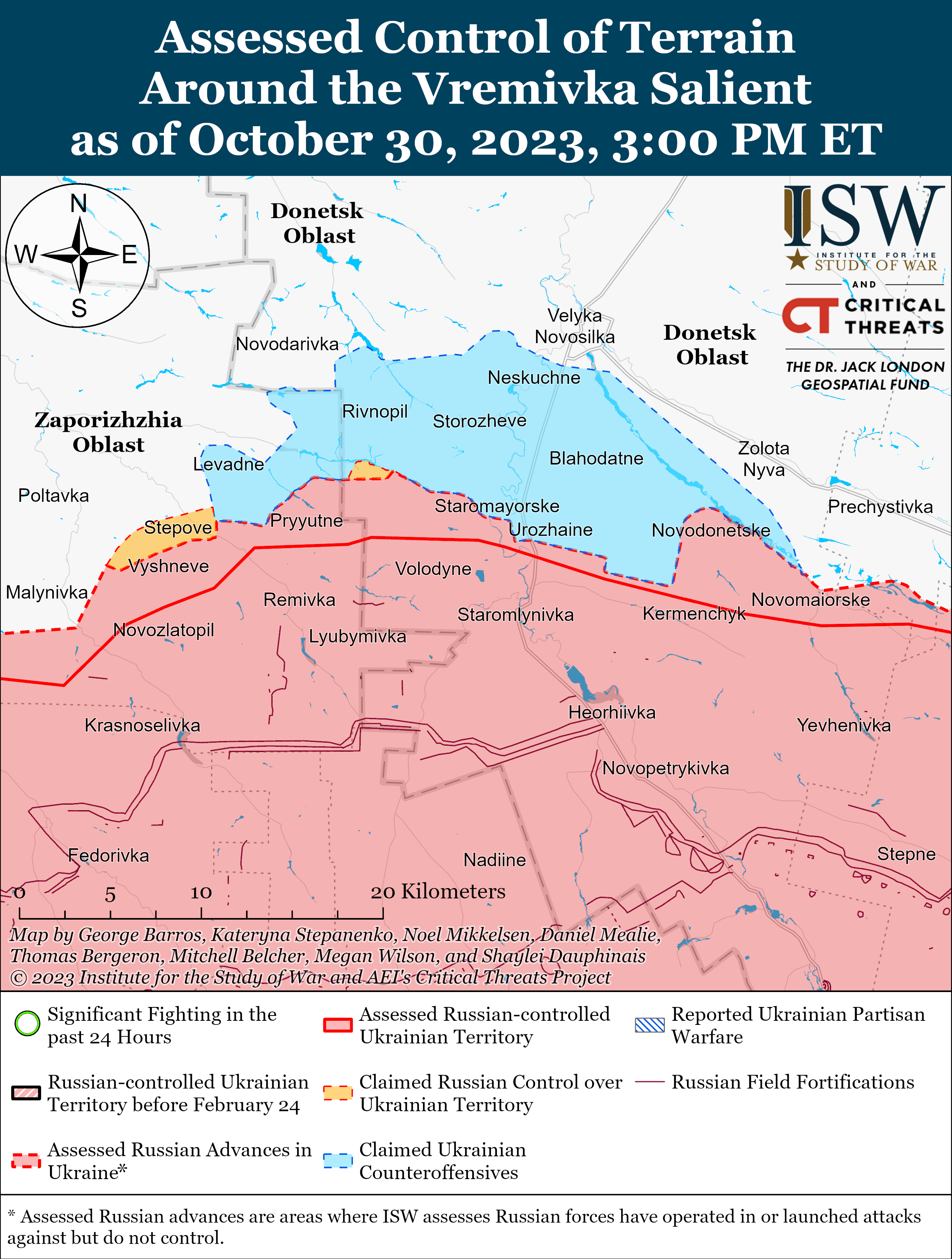
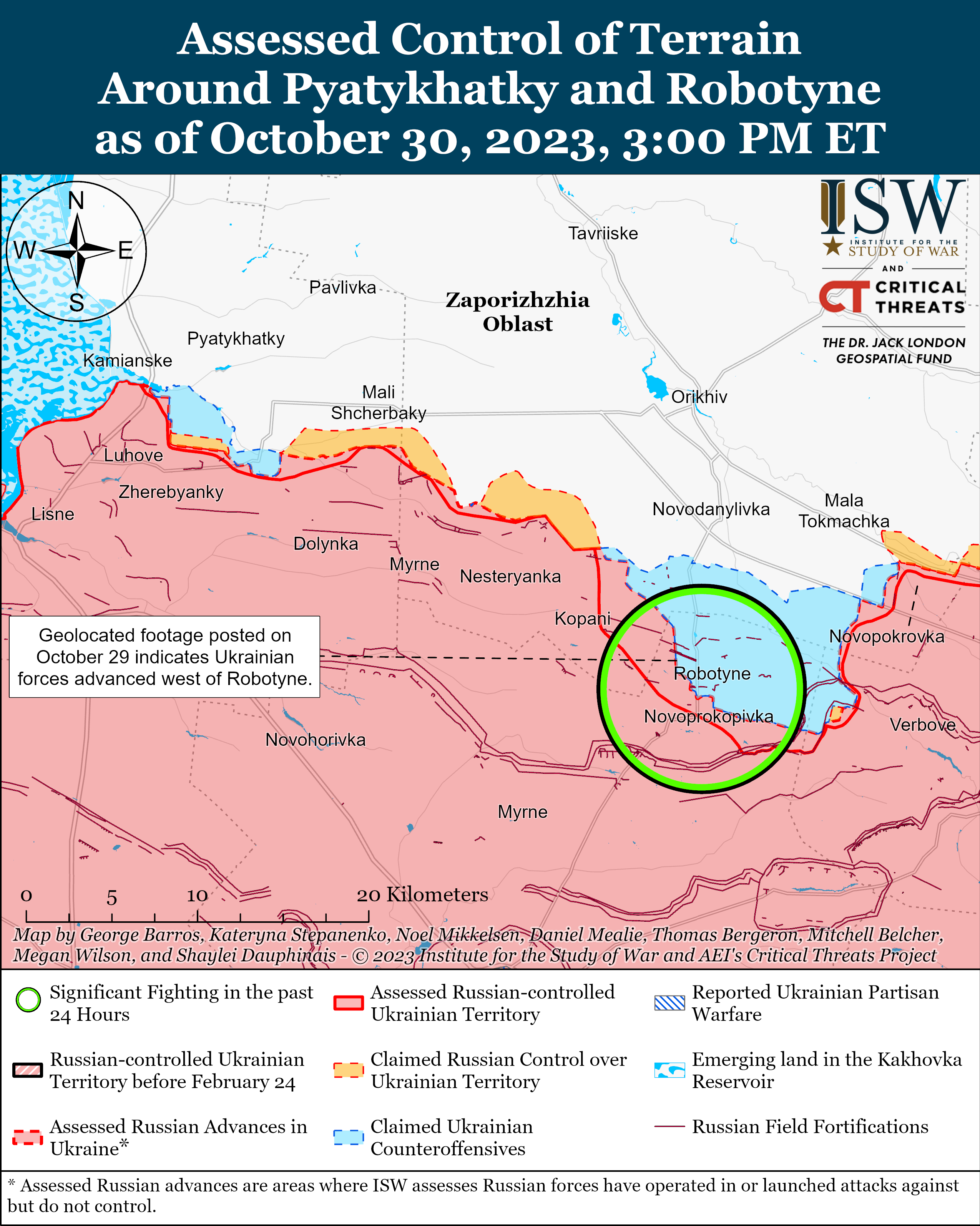
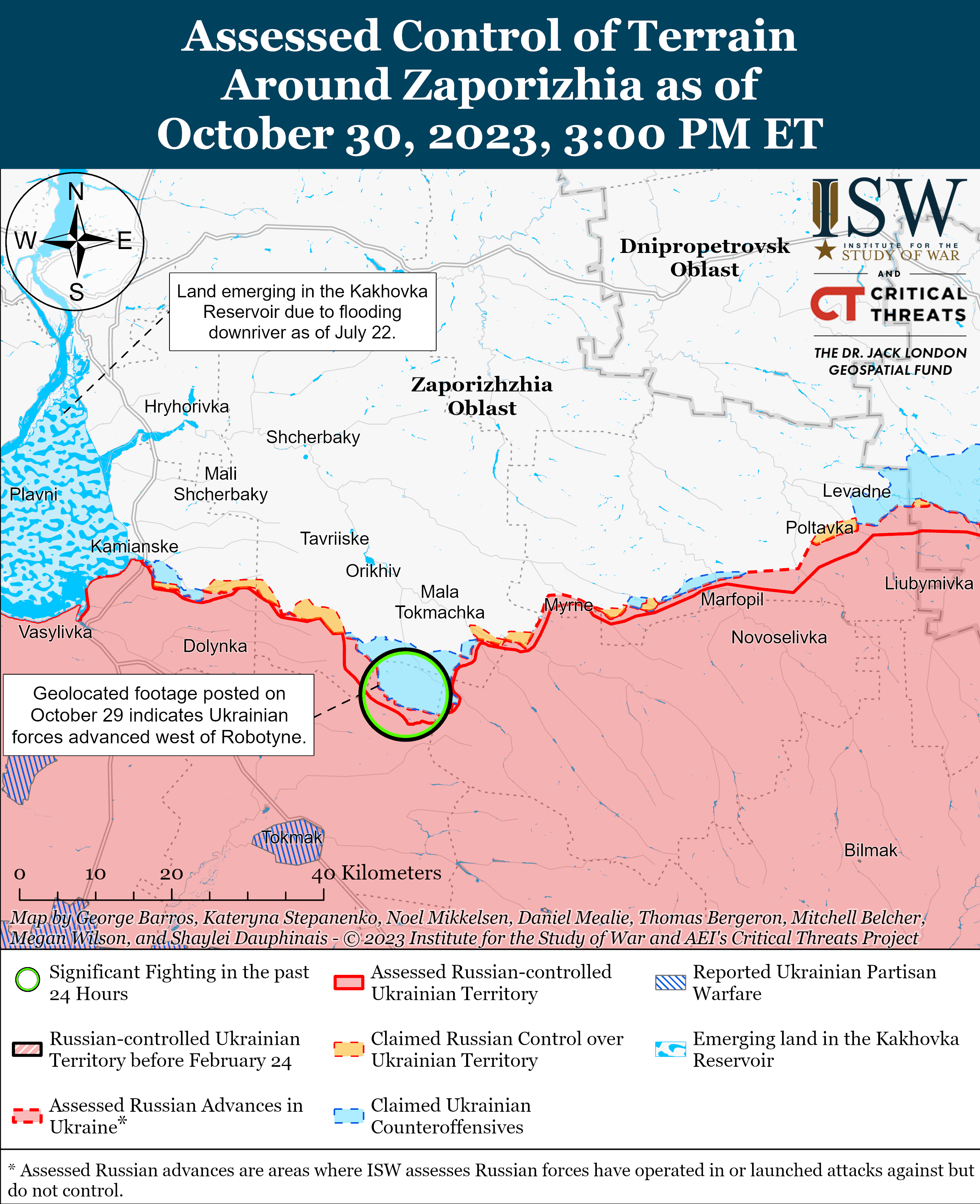
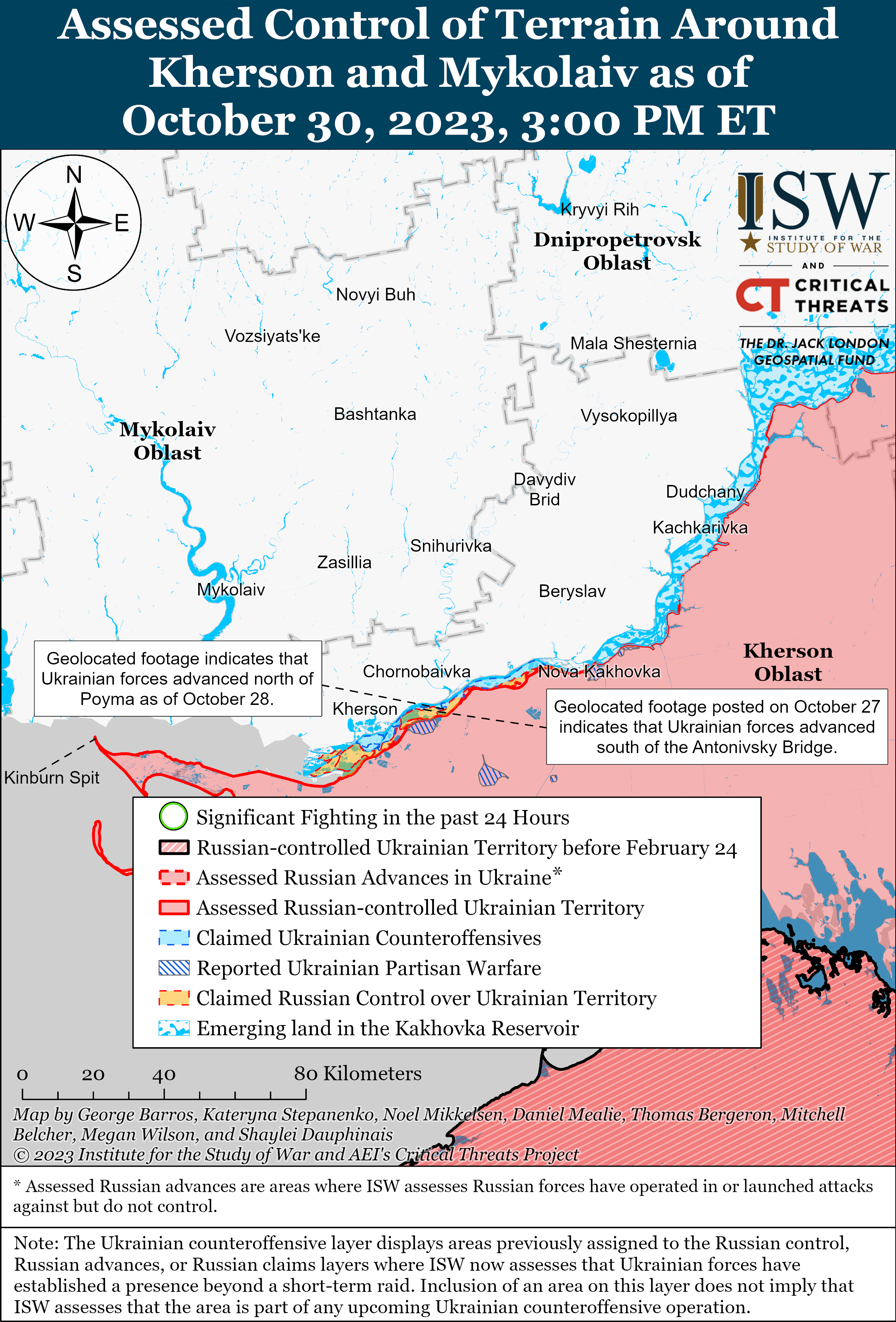
No comments:
Post a Comment